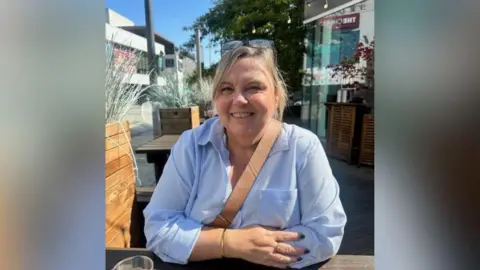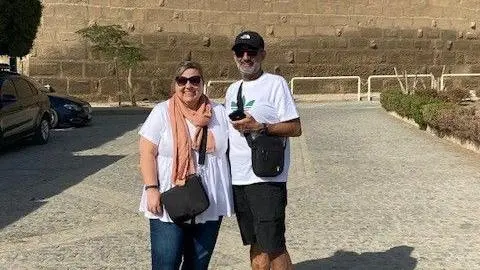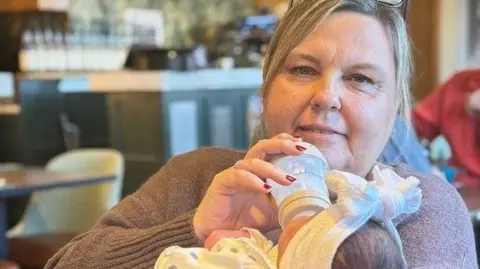'I was told I had Parkinson's at 51, but I still enjoy life'
 Jo Ghani
Jo GhaniWhile undergoing an assessment at a job interview in 2016, Jo Ghani noticed her leg was shaking so hard it was "banging against the table leg".
"I knew I was nervous, but I thought 'That's a bit extreme'," she recalls, nine years on. "But I just brushed it off."
Two years later, at the age of 51, Jo was diagnosed with Parkinson's - an incurable and degenerative condition which affects movement.
"I'd spent months Googling my symptoms and everything kept coming back to Parkinson's," Jo, from Huddersfield, says.
"But I thought I was too young for that. Even though I'd concluded by that point it was a possibility, it was still a huge shock when I got the diagnosis."
Jo had noticed she had issues with her legs and increased difficulty walking in the years beforehand.
"I lost my mum in 2013 and I put it down to grief, and the menopause, and that kind of thing," she says.
"I just thought I needed to get a grip."
 Jo Ghani
Jo GhaniBut as the years progressed more symptoms appeared. An exercise instructor noticed she used her left hand unusually little while throwing a ball and a tremor appeared in her little finger.
Just over six years on from her diagnosis, Jo is part of a Yorkshire and Humber support group for younger people with Parkinson's, many of whom are of working age and rely on regular exercise to ease their symptoms.
The group is leading a walk at the Yorkshire Sculpture Park in Wakefield on Saturday to mark World Parkinson's Day and to raise money, awareness and support for those living with the condition.
Parkinson's UK estimates there are around 150,000 people across the country living with it. And although it is more commonly diagnosed in those over the age of 70, a small proportion are told they have it before they turn 50.
There are around 40 different symptoms, but the condition affects people in different ways.
For Jo, discovering a network full of people who could relate to her has been invaluable.
"A lot of Parkinson's support groups I initially found met and did exercise classes during the day, which was no good for me because that's when I'm working," the mum-of-two explains.
"For people with Young Onset Parkinson's you've got different needs.
"You need to exercise and keep moving. I go to the gym as much as I can and I go to Aqua Fitness whenever I can. I try to do something every day, even if it's just walking to the shops.
 Jo Ghani
Jo Ghani"I also do boxing sessions at a gym in Morley on Saturdays specifically for people with Parkinson's. There's about 12 of us who do it, men and women, and you feel really energised by it all."
After discovering her support group shortly after the pandemic, Jo has forged lasting friendships with other people in the region living with the disease.
Coffee mornings, meals out with their partners and even karaoke nights are among the social activities they do.
"Sometimes we talk about Parkinson's, but we also talk about what we did at the weekend as well," Jo says. "There's no real structure to it.
"It's so important to speak to other people with the condition, because they understand the issues you face every day.
"It's so difficult to explain what it's like to have Parkinson's because unless you have really bad shakes, people might look at you and think there's nothing wrong with you.
"Everyone's affected by it in different ways."
'You need to keep active'
Jo gave up her job as a solicitor following her diagnosis after finding her tremors knocked her confidence, but she went on to take on a senior clerical position within an academies trust.
Although she has enjoyed a supportive work environment, she is likely to take early retirement through ill health soon.
"For the most part I live a normal life but it is degenerative and the stress of work is not good for it," she explains.
"You need to keep active and sitting at a desk for seven hours a day is not conducive to that really.
"The fatigue is overwhelming and sometimes it's a real struggle just to keep my eyes open."
 Jo Ghani
Jo GhaniAnother challenge is the ignorance and rudeness of people in everyday places like the supermarket checkout queue.
"One of the symptoms is just general slowness and packing bags with the lack of dexterity you have can be really difficult," Jo says.
"You do get a lot of tutting behind you if you're not going that quickly.
"Sometimes I ask the cashier to slow down and I explain I've got Parkinson's. It's little things like that. I don't want to keep announcing it to the world, but sometimes you have to give that context."
Overall though, Jo's message is one of positivity and says that while her condition has deprived her of some things, it has opened up new opportunities and experiences she would not have otherwise had.
Her advice for anyone who has recently been told they have the condition is to find a support network, keep exercising and "focus on today".
"It's an addition to your life, but it's not your whole life," she insists.
"A positive outlook is so important. It's not what life throws at you, it's how you deal with it.
She adds: "I allowed myself to wallow in the first few months after my diagnosis. My head was in a daze and I sat there thinking 'What's the future going to be like?'
"But doing that, I realised that I was wasting the time that I did have. And I'm not going to do that."
Listen to highlights from West Yorkshire on BBC Sounds, catch up with the latest episode of Look North.
